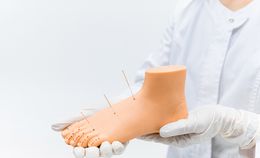I thought I was relaxed . . .
Relaxation is such a common reference in our everyday lives that it often loses its impact and importance.
Would you agree? As a relaxation expert, a.k.a. massage therapist with 20 years of experience, I have often had therapists comment during a massage to “Relax.” If someone were to say that to you, how would you react?
My reaction was to question whether I wasn’t relaxed already and what I could do to fulfill the relaxation instruction since the therapist sensed that I was not relaxed. After that, my thoughts swirled around this statement that felt more like a directive.
Definition of Directive (from yourdictionary.com)
adjective
The definition of directive is something related to management or control of an operation.
If your boss puts you in charge of managing a project, this is an example of when you are in a directive role.
noun
A directive is defined as an order or an official instruction.
When your boss orders you to call a client, this is an example of a directive.
When we tell someone what to do, they often resist. When we are told what to do, we often resist. Even when something we are told is for our own good (and it may be), the manner in which we receive that information makes all the difference. If you happen to be a parent, you know this all too well! How many times have you told a child to do something that was good for them and felt completely ignored or blatantly defied? There may be some verbal bantering as well, but the bottom line is they resisted.
When I work with clients doing therapeutic massage, I often say to them, “Allow your arm to be heavy.” When you hear that, how does that make you feel? I believe inviting others to respond with a less direct word is far more ‘inviting’ than direct instruction.
It’s a paradoxical fact that when someone is getting stressed out, one of the least effective (and perhaps most annoying) things to say is “Relax.” says Sue Shellenbarger in the WSJ
Relaxing on command is physiologically impossible if “the body is already too acutely stressed to turn it around,” says Wendy Mendes, a professor of emotion at the University of California, San Francisco, and a researcher on stress. While the body responds rapidly to stress, returning to a relaxed state can take 20 to 60 minutes, Wendy says.
‘Calm Down!’ can be well-meant, but when a boss makes this command, an employee can feel even more stressed as well as defensive or angry. Open-ended questions like ‘How’s it going?’ or ‘Would you like to talk?’ invite the employee to describe the pressure they are under, helping them to share their stress and feel better.
Let Me Guide You
Have you experienced this in your own body? Something happens and your body adrenaline ramps up in response. Then you feel your heart beating harder and faster and you keep going over reviewing or reliving the event or situation again and again. Relaxation seems impossible. This might be in traffic, or it may be in a relationship disagreement. Whatever the case, our body responds automatically and without hesitation. This is a stress response.
This combination of reactions to stress is also known as the "fight-or-flight" response because it evolved as a survival mechanism, enabling people and other mammals to react quickly to life-threatening situations. A stressful situation – project deadline, job security anxiety, family health crisis – can trigger an unleashing of stress hormones that result in physiological changes. It’s exactly like an alarm going off in our body. Understanding this from an intellectual perspective doesn’t change the physical manifestation, but it does help us understand how our body is responding.
As a relaxation expert, my goal through Be Well And Renew is to invite you into opportunities to incorporate relaxation into your day. An example is guided meditations that are available to help with a relaxation response for body, mind, and spirit.
Providing a complimentary guided meditation when people subscribe to the Be Well And Renew newsletter allows you to find out how easy it is to sit back, plugin, and listen to a voice that guides you to a more relaxed state by providing very descriptive details that guide the mind through a scene. This activity helps to distract us from the stress of ongoing situations in only 10-15 minutes. What’s great is that it is portable and can be downloaded to any device so you have it with you with a stress event strikes. You may even know ahead of time when something will be stressful! Carve out a 15-minute window before or after this and enjoy listening to something that will reduce your anxiety and possibly help you handle the situation better. Listening to it afterward can help you allow it to leave your energetic focus. Listening will lower your blood pressure and as the old Calgon commercials used to say, “Take me away.”
If guided meditation doesn’t sound like a way to find a relaxing window of time, what works for you? Use that knowledge and plug it into your day more regularly. Don’t wait for stressful situations. Help your body, mind, and spirit more often be in a healthier and happier state. If you aren’t sure what works for you, experiment. There are many resources, tools, techniques, and tips that you can access easily and freely.
Stress creates agitation
Stress is something most of us deal with on some level. And it’s increasing, given the rising use of anti-anxiety medications, notes Stanford University researcher Emma Seppälä.
Meditation, not medication, allows people to take charge of their nervous system and emotions. For some of us the question becomes ‘Who’ or ‘What’ is causing that stress? Sometimes we create our stress by striving for perfection. The reality is that perfection is not humanly possible. “Perfection is a mathematical term, not a human ability.”
Hearing this, for me, was transformational. I can strive to do my very best, but don’t need to think of it in terms of perfection, which can drive me to unrealistic expectations. There always seems to be some small glitch or error in a project or task. At least for me! When I heard this many years ago from Fr. Richard Rohr, a Franciscan priest, I was very grateful. He has a wonderful organization called CAC, Center for Action and Contemplation.
This organization provides daily email reflections, online events, conferences, and books and resources. His men’s work has been transformational for many to help look within in a society that always expects men to be stoic and unemotional. You can check it out at CAC. You may be surprised by some of the topics. It’s not about religion, it’s about spirituality.
Research Shows Meditation Can Slow Aging
Studies show that meditation changes brain physiology to slow aging. “Cognition seems to be preserved in meditators,” says Sara Lazar, a researcher at Harvard University. Lazar adds that people who meditate also have more gray matter – literally, more brain cells. I will agree that meditation is not for everyone, but there are many ways of executing a meditative state. Some are walking meditations, including labyrinths.
Breathwork is a wonderful vehicle to bring attention to the moment, which is very simply a meditative state. Meditation is not stopping our thoughts. Our brain was created to think, so expecting it to stop like an engine, is simply not possible. This was very helpful to me when I realized that. The expectation became more manageable. Meditation is not being attached to the thoughts that come through our minds. Let them float by and be unattached to them.
Relaxed With The Written Word
One of my favorite ways to achieve relaxation is reading, writing and sharing poetry. I will be sharing some of my poems in upcoming blogs.
One of my favorite poems was written after a floating experience. Floating has become one of my favorite relaxation modalities. I allow myself to simply breathe and float for one hour in a tank of concentrated Epsom saltwater. I am off the grid and allow thoughts to flow through me and not attach to them or try to solve any issues. The concentrated salt environment is healthy in ways I never expected, such as reducing inflammation in the body. You can check out the local float tank I frequent. Anicca Float Club
There Is A Better Way
Be Well And Renew is all about wellness and how you achieve that is dependent on many factors. Providing a wide variety of choices is how we provide the goal of your personal definition of wellness. I would love to know what your definition of wellness is and how you make that real in your everyday life.
Whether you have a traditional meditation practice, have an exercise routine, put your thoughts down on paper, or receive regular bodywork, it is commendable that you have found what works for you to be happier and healthier. Utilize what works for you but also expand your horizons and consider some other resources or services that may be a pleasant surprise to your body, mind, and spirit.
Relaxation does not help when it is only talked about. Talking about it or dancing around the topic is a brain activity, not body activity.
Speaking of dancing, that can be a very relaxing activity. Let go and allow your body to move without judgment. Find music that makes your body move even without trying. When your toes start tapping and your fingers start snapping, enjoy it and let it happen!
My wish is always for you to BE WELL, and however I may help to facilitate that for you is why this blog exists. Feel free to share this blog or respond with your thoughts. I’m always happy to hear from you.


























